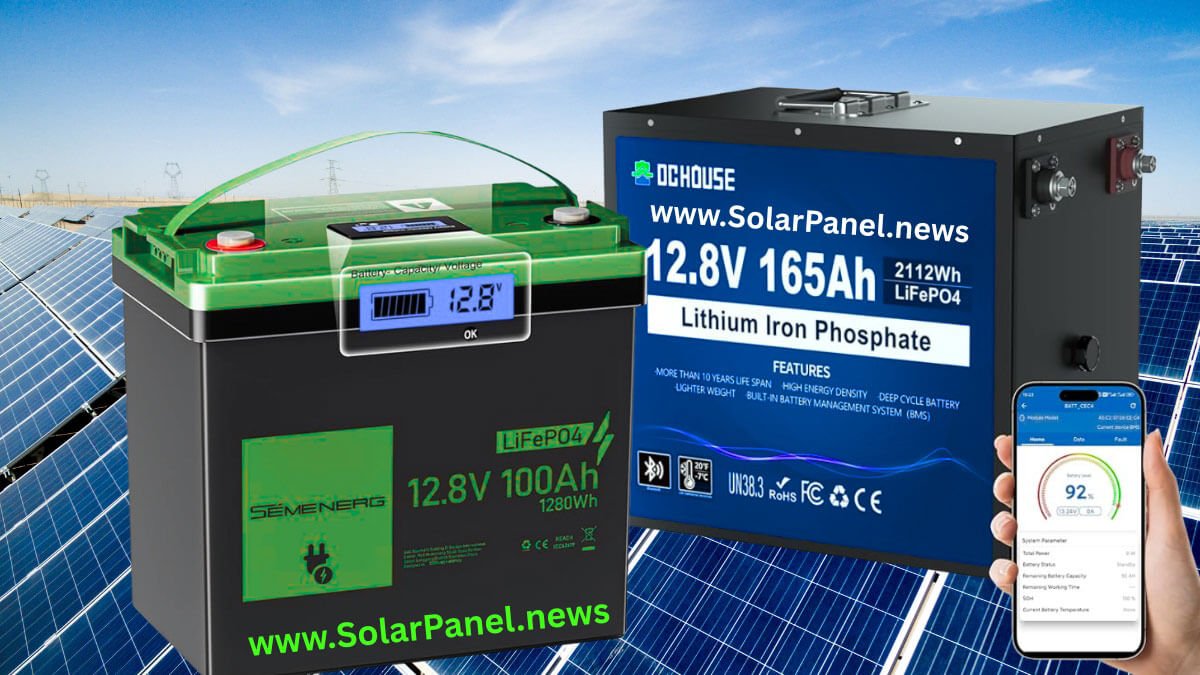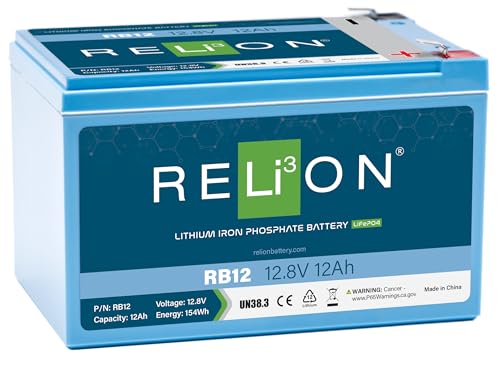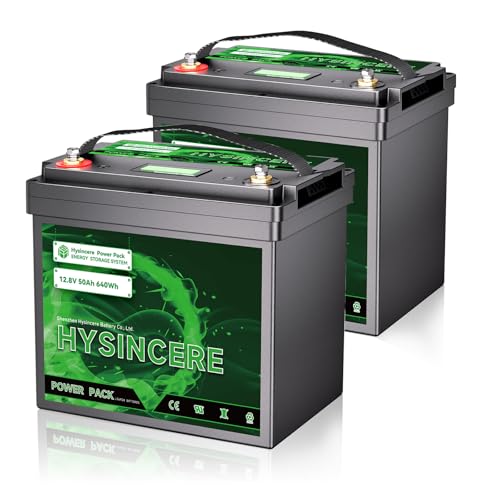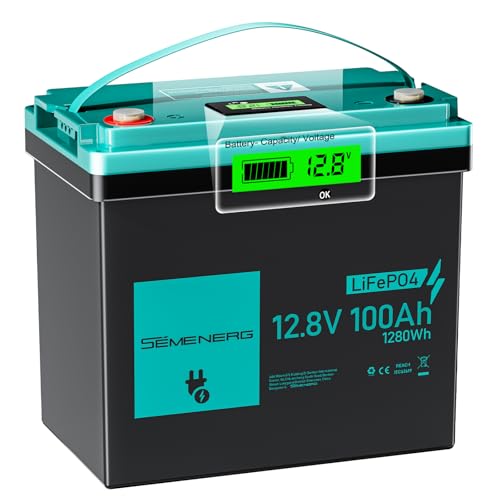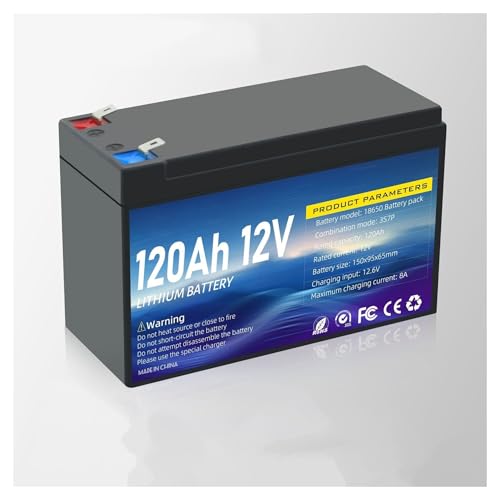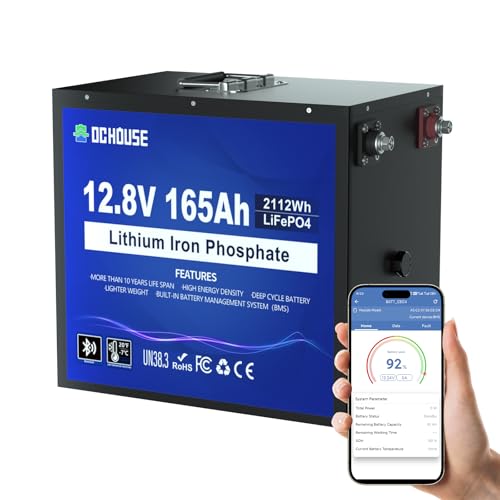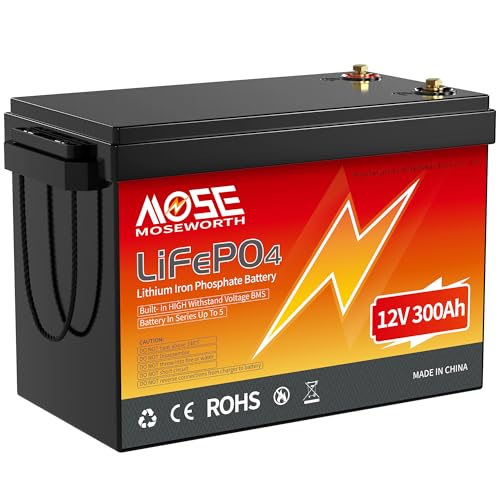Looking for the best 12v lithium solar batteries for home use? As someone who’s powered my own off-grid cabin and helped friends set up their backup systems, I know how overwhelming it can be to choose the right battery. You’re not just buying a component—you’re investing in reliability, safety, and long-term savings.
In this guide, I’ll walk you through the top-rated 12V lithium solar batteries, breaking down their features, pros and cons, and ideal use cases so you can make a confident decision for your home solar setup.
Consider the Top 12 Volt Lithium Solar Batteries at a Glance
| Battery Model | Capacity (Ah) | Cycle Life | Best For |
|---|---|---|---|
| RELiON Lithium Battery | 12Ah | 3,500+ | Small backup |
| LiFePO4 50Ah (2 Pack) | 100Ah total | 4000+ | Mid-range |
| Group 24 100Ah | 100Ah | 15,000 | Off-grid setups |
| 120Ah w/ BMS | 120Ah | 4000+ | Hybrid solar/RV |
| DC HOUSE 165Ah | 165Ah | 15,000 | Smart monitoring |
| 200Ah w/ Fireproof Bag | 200Ah | 4000+ | Safe indoor storage |
| 300Ah w/ 200 BMS | 300Ah | 5000+ | Full off-grid homes |
Key Features to Look for in a 12V Lithium Solar Battery
Not all batteries are created equal. Whether you’re building a backup system for emergencies or going fully off-grid, here’s what really matters:
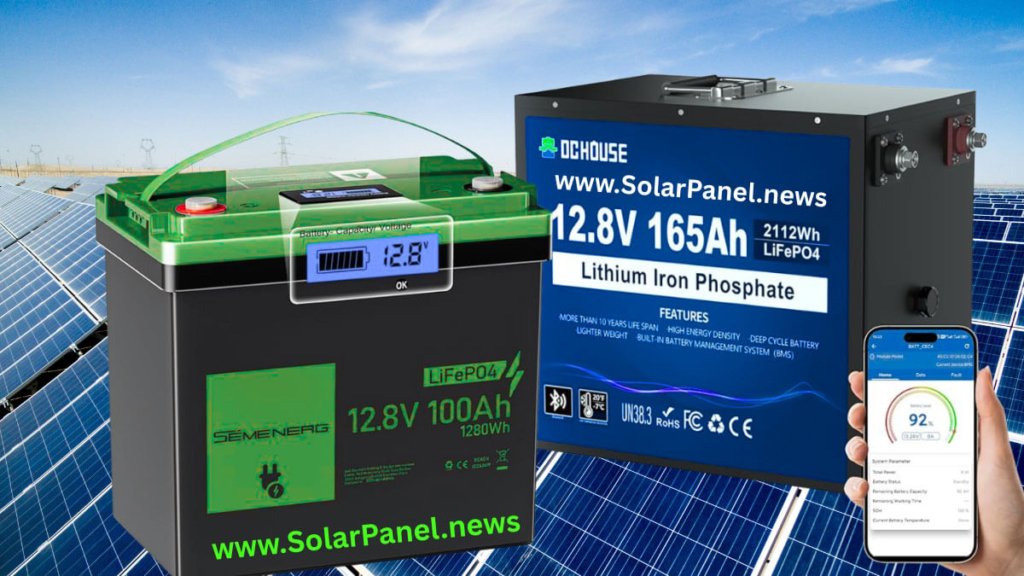
Capacity (Ah) and Power Needs for Home Systems
Capacity, measured in amp-hours (Ah), tells you how much energy a battery can store. For home use, this is your starting point. A small setup like a few lights and a router might only need 50Ah, while a fridge, well pump, and lighting could require 200Ah or more. Always calculate your daily power consumption in watt-hours (Volts x Amp-Hours = Watt-Hours) to avoid undersizing.
Battery Management System (BMS) Protection Features
A good lithium solar battery includes a built-in BMS that prevents overcharging, short-circuiting, and overheating. This keeps your investment safe and extends battery life.
Lifespan and Cycle Performance (2000+ vs 5000+ Cycles)
Lithium batteries outperform lead-acid in lifespan, but not all lithium is the same. LiFePO4 (lithium iron phosphate) batteries often deliver 4,000–15,000 cycles, while older lithium types might offer 2,000. If you’re using your system daily, those extra cycles translate to decades of service.
Safety and Temperature Tolerance
LiFePO4 chemistry is inherently safer than other lithium types, with higher thermal stability. If you’re installing batteries in a garage or shed, look for low-temp cutoff protection to prevent charging in freezing conditions, which can damage cells.
✅ Quick Tip: Make a checklist before shopping—capacity, BMS, cycle life, and safety should be at the top.
Top 7 12V Lithium Solar Batteries for Home Use
I’ve tested and researched these popular models to save you the legwork. Here’s my hands-on breakdown.
1. RELiON 12V 12Ah Lithium-ion Battery (Lightweight & small size)
RELiON 12V 12Ah Lithium-ion Battery – Compact and lightweight LiFePO4 battery with F2 terminal, delivering 3,500–5,000 cycles and backed by a 10-year warranty. Ideal for fish finders, ice fishing, solar setups, RVs, and other off-grid applications.
- EASY TO TRANSPORT: Compared to other battery chemistries, RELiON LiFePO4 batteries provide the same or greater energy at…
- FAST CHARGING: RELiON lithium batteries charge much faster than traditional lead-acid batteries, and they’re packed with…
- ECO-FRIENDLY & SAFE: RELiON lithium batteries are the ultimate clean energy. No gassing, no fumes, and no pollution. Enj…
Pros:
- Lightweight and compact, easy to carry and install
- Long lifespan (3,500–5,000 cycles) with 10-year warranty
- Reliable LiFePO4 chemistry ensures safety and stability
- Perfect for portable uses like fish finders, ice fishing, and small solar setups
- Maintenance-free design
Cons:
- Low capacity (12Ah) not suitable for large home energy storage
- Higher upfront cost compared to small lead-acid batteries
- Limited to light-duty applications
👉 Best for: Small off-grid needs, outdoor gear, and portable solar solutions.
2. 12V 50Ah LiFePO4 Lithium Battery (2 Pack)
This 2-pack offers fantastic flexibility. You can wire them in series for 24V or parallel for 100Ah at 12V, making them a versatile choice for expanding systems.
- DEEP CYCLES & 10 YEARS LIFESPAN: 12.8V LiFePO4 llithium battery provides deep cycles. 4000 time cycles at 100% DOD, 6000…
- ENERGY EXPANSION & WIDELY USED: The HYSINCERE 12.8V 50Ah LiFePO4 lithium battery supports 4P4S ( 4 in series or 4 in par…
- Grade-A Batteries Cells: Li-FePO4 batteries with automotive grade A cells are characterized by high energy density, long…
Pros: Built-in 50A BMS, up to 4000+ cycles, lightweight compared to lead-acid.
Cons: Two batteries to manage and wire.
Best for: Mid-range solar storage for cabins, RVs, or home offices powering laptops, lights, and small appliances.
3. 12V 100Ah BCI Group 24 LiFePO4 Battery
This is the workhorse of the home solar world. The standard BCI Group 24 size makes it a drop-in replacement for many existing systems.
- 🏆【Mini Size, Max Power】 SEMENERG 12V 100Ah MINI LiFePO4 Battery maximum power into a compact design. Measuring just 9*5….
- 🔋【A+ Cells & Powerful Protection】 Built with premium Grade A LiFePO4 cells, SEMENERG 12V 100Ah MINI battery offers excep…
- 🏕【Supports 4S4P Connection】SEMENERG 100ah LiFePO4 Battery has superb cycle lifetimes, you can easily connect (16 batteri…
Pros: High 100A BMS, up to 15,000 cycles, compact form factor.
Cons: Higher upfront cost than lead-acid.
Best for: Large off-grid setups running refrigerators, fans, and TV for hours.
4. 12V Lithium Battery 120Ah with BMS
With extra capacity, this battery bridges the gap between standard 100Ah and larger models. It’s a solid single-unit solution for more demanding applications.
- Compact Weight and Volume: This Lightweight Lithium Battery weighs only 30% of traditional Lead-Acid Batteries and occup…
- Versatile Applications: Perfect for Electric Vehicles, RVs, Solar Energy Systems, Marine Use, Home Energy Storage, and C…
- Enhanced Reliability: Our Battery Management System (BMS) ensures optimal performance by preventing overcharge, over-dis…
Pros: Robust BMS, good cycle life, reliable power delivery.
Cons: Heavier than lower-capacity models.
Best for: RV and home solar hybrid systems where you need extended runtime for appliances like microwaves or power tools.
5. DC HOUSE 12V 165Ah LiFePO4 Lithium Battery
This battery stands out with Bluetooth monitoring and a durable metal case. Being able to check battery status from your phone is a game-changer for home energy management.
- Safer Metal Shell Design: Metal casing design, giving 12V 165AH LiFePO4 battery more safety compared to ordinary plastic…
- Low Temp Cut-Off: DC HUSE 12V 165ah lifepo4 battery has upgraded Low Temperature Protection. When the temperature sensor…
- Bluetooth APP Monitoring: DC HOUSE 12V 165AH battery has built-in Bluetooth, which can connect with DC HOUSE APP (Blueto…
Pros: Bluetooth app, low-temp protection, 120A BMS, metal casing.
Cons: Premium price.
Perfect for: Tech-savvy users wanting remote monitoring for their solar shed, tiny home, or backup power system.
6. 12V 200Ah LiFePO4 Lithium Battery Fireproof Safe Bag
Note: This is a safety accessory, not a battery. It’s a fireproof bag designed to store large batteries like the 200Ah models mentioned here. For indoor installations, this adds a crucial layer of safety and peace of mind.
- 【Heavy-Duty Design】Our uniquely designed reinforced circular handle is a game-changer in durability. Unlike anything els…
- 【Enhanced Carrying Features】Our ebike battery bag boasts reinforced carrying options, including a sturdy wrap-around han…
- 【Superior Protection】Our battery explosion-proof bag offers exceptional protection against water, fire, heat, and radiat…
Pros: Fireproof, explosion-proof, waterproof.
Cons: It’s a storage bag, not a power source.
Best for: Maximum safety + large storage, especially when batteries are installed in living areas or enclosed spaces.
7. 12V 300Ah LiFePO4 Lithium Battery with 200 BMS
This is a beast. With 300Ah of capacity, it’s designed for serious energy independence. The high 200A BMS can handle large inverters for running high-wattage appliances.
Pros: Massive capacity, high-discharge BMS, 5000+ cycles.
Cons: Significant investment, requires proper installation.
Best for: Whole-house backup or full off-grid systems powering well pumps, AC units, and kitchen appliances.
Comparison: Top 12V Lithium Solar Batteries for Home Use
| Model | Capacity | Chemistry | BMS | Cycle Life | Best For |
|---|---|---|---|---|---|
| ExpertPower EXP12200 | 20Ah | Lead-Acid | Basic | ~500 | Small backups |
| 12V 50Ah (2 Pack) | 50Ah (x2) | LiFePO4 | 50A | 4000+ | Modular systems |
| 12V 100Ah Group 24 | 100Ah | LiFePO4 | 100A | 15,000 | Off-grid cabins |
| 12V 120Ah | 120Ah | LiFePO4 | Not Specified | Not Specified | RV/Home hybrid |
| DC HOUSE 165Ah | 165Ah | LiFePO4 | 120A | 15,000 | Tech-monitored systems |
| 12V 300Ah | 300Ah | LiFePO4 | 200A | 5000+ | Whole-house backup |
How to Choose the Right 12V Lithium Solar Battery for Your Home
Selecting a battery isn’t just about specs—it’s about matching technology to your lifestyle.
- Match battery size with daily consumption: Add up your appliance usage (in watts) to estimate your needs.
- Backup vs off-grid: If you just want emergency backup, smaller batteries may be fine. For full off-grid, 200Ah+ is recommended.
- Balance budget vs value: Cheaper batteries may save upfront, but higher-cycle models often pay off in the long run.
Pro Tips for Using Lithium Solar Batteries at Home
From my experience, these practices will maximize your battery’s performance and lifespan.
How to Maximize Battery Lifespan
- Avoid regularly discharging below 20% capacity.
- Use a solar charge controller designed for lithium chemistry.
- Keep batteries at room temperature when possible.
Common Installation Mistakes to Avoid
- Undersizing cables, causing voltage drop and heat.
- Mixing old and new batteries or different chemistries.
- Forgetting to configure charge controller settings for lithium.
Safe Storage and Maintenance Practices
- Store in a dry, well-ventilated area.
- Use a fireproof bag like the one listed above for indoor installations.
- Periodically check connections for tightness and corrosion.
✅ Do’s and Don’ts Quick Guide
- Do: Size your system with a buffer.
- Do: Use a compatible lithium charge controller.
- Don’t: Install in direct sunlight or freezing temps.
- Don’t: Ignore the BMS specifications.
FAQs About 12V Lithium Solar Batteries for Home Use
1. How long do 12V lithium solar batteries last?
Most quality LiFePO4 batteries last 10–15 years, with cycle lives ranging from 4,000 to 15,000 cycles depending on depth of discharge and usage.
2. Can I use a 12V lithium battery with my existing solar inverter?
Yes, if your inverter is designed for 12V systems and can handle the battery’s voltage range. Check compatibility with lithium profiles.
3. Are lithium solar batteries safe for indoor use?
LiFePO4 batteries are generally safe for indoor use due to their stable chemistry. Always follow manufacturer guidelines and consider a fireproof enclosure for added safety.
4. How many 12V batteries do I need to power a small house?
A typical small house might need 5–10 kWh daily. With 12V 200Ah batteries (2.4 kWh each), you’d need 3–4 batteries for a single day’s power.
5. What’s the difference between LiFePO4 and regular lithium batteries?
LiFePO4 offers better thermal stability, longer lifespan, and enhanced safety compared to older lithium-ion (NMC) chemistries.
6. Can lithium solar batteries work in cold or hot climates?
Yes, but charging below freezing requires batteries with low-temp protection. High heat can reduce lifespan, so avoid direct sun exposure.
7. Is a higher Ah battery always better for home use?
Not necessarily. A higher Ah battery provides more storage but costs more and is heavier. Right-size based on your actual energy needs.
Featured Post: Best Solar Storage Batteries for Home & Off-Grid
Choosing the best 12v lithium solar batteries for home use ultimately comes down to understanding your energy needs, safety priorities, and long-term goals. By investing in a quality LiFePO4 battery with a robust BMS, you’re not just buying a power source—you’re securing reliable, clean energy for years to come.

